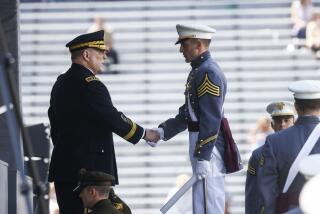General Predicts Rise in Violence
- Share via
WASHINGTON — A top U.S. commander told Congress on Tuesday that the level of violence in Iraq is likely to increase -- not decrease -- after sovereignty is returned to Iraqis in one week.
Marine Gen. Peter Pace, vice chairman of the Joint Chiefs of Staff, said that insurgents were likely to step up the number of attacks against U.S. troops and Iraqi civilians as the country moved toward installing a permanent representative government in elections next year.
“We should expect more violence, not less, in the immediate weeks ahead,” Pace said at an often contentious hearing of the House Armed Services Committee.
For months, top U.S. officials have said that violence is likely to level off or even decrease after the June 30 transfer of sovereignty, as insurgents come to see derailing the political process as impossible. Pace’s comments indicate that the U.S. government is recalibrating its assessment of the strategy and capabilities of the insurgency.
Shortly after ousted dictator Saddam Hussein was captured in December, some U.S. commanders in Iraq predicted that the insurgency would lose steam. But 2004 has seen some of the bloodiest months for U.S. troops in Iraq.
Both Pace and Deputy Defense Secretary Paul D. Wolfowitz, who also spoke to the committee Tuesday, testified that although Iraqi security forces were rapidly expanding, they would require the backing of a significant number of U.S. and coalition forces for the foreseeable future.
Wolfowitz, who recently returned from a brief trip to Iraq, testified that there were signs of tremendous progress in the country, but said he could not predict exactly how long foreign troops would need to remain. It would depend, he said, on when Iraqis could assume responsibility for the security of their country.
“I can’t tell you how long that’s going to take,” Wolfowitz said. “It’s dangerous. I remember when people were up here eight years ago saying we’d be in Bosnia only for a year. We are finally about to end the Bosnia mission -- what is it? -- eight years later. This is a vastly more important mission for our national security, and it’s important to stay and finish it.”
Wolfowitz was sharply questioned by Democrats on the committee, who charged that the Bush administration did not have a clear strategy for getting U.S. forces out of Iraq. The committee’s ranking Democrat, Rep. Ike Skelton of Missouri, likened the situation to a “security quagmire” and pressed Wolfowitz on the exit timetable.
“Is it your testimony you think that we might be there, then, a good number of years?” Skelton asked.
“I think it’s entirely possible,” Wolfowitz responded.
The Army, which is shouldering most of the fighting burden in Iraq, has drawn up detailed plans for maintaining more than 140,000 troops there through January 2007, a senior Army official said Tuesday.
“We have to expect to maintain the current level of troops” until then, the official told a small group of reporters at the Pentagon.
The 1st Armored Division, whose yearlong tour in Iraq was extended in April for three months, is expected to return to its bases in Germany and the U.S. at the end of July, the Army official said.
Skelton also demanded an accounting of the millions of dollars the Pentagon gave to Ahmad Chalabi’s Iraqi National Congress for intelligence gathering. Before the war in Iraq, the Pentagon began paying the INC a monthly stipend of $340,000 to gather information about Hussein’s military capabilities; the group provided U.S. intelligence officials with a number of Iraqi defectors who gave information that has since been discredited.
Wolfowitz acknowledged that the record of the INC was a “mixed picture,” but said that after the war began, the group provided the U.S. military with documents that led to the capture of insurgent leaders.
Wolfowitz and Pace responded to recent statements by Iraq’s interim leaders that they might consider implementing martial law after June 30 to crack down on the insurgency. Just as in Afghanistan, they argued, U.S. forces would not be obliged to carry out such an edict.
“We’d also discuss with them the wisdom of doing it, and I think they’d be listening to us, just as [Afghan] President [Hamid] Karzai listens to us about the edicts that he proposes,” Wolfowitz said.
Times staff writer Esther Schrader contributed to this report.
More to Read
Get the L.A. Times Politics newsletter
Deeply reported insights into legislation, politics and policy from Sacramento, Washington and beyond. In your inbox twice per week.
You may occasionally receive promotional content from the Los Angeles Times.










